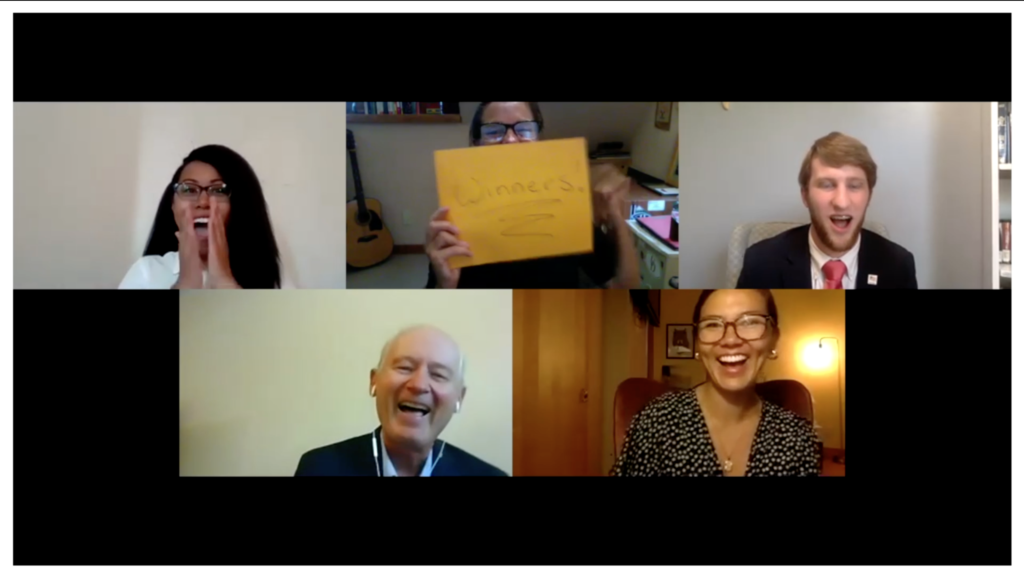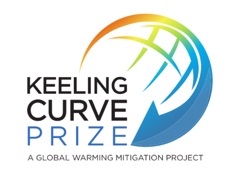 On Monday, July 27, the Coronado-based nonprofit Citizens’ Climate Lobby was awarded the 2020 Keeling Curve Prize during a virtual awards ceremony hosted by CBS News meteorologist Jeff Berardelli and actress, supermodel and entrepreneur Amber Valletta. Citizens’ Climate is focused on the advancement of bipartisan climate change mitigation policies, such as national dividend and carbon fee policies.
On Monday, July 27, the Coronado-based nonprofit Citizens’ Climate Lobby was awarded the 2020 Keeling Curve Prize during a virtual awards ceremony hosted by CBS News meteorologist Jeff Berardelli and actress, supermodel and entrepreneur Amber Valletta. Citizens’ Climate is focused on the advancement of bipartisan climate change mitigation policies, such as national dividend and carbon fee policies.
In 2018, its sister organization, Citizens’ Climate Education, was awarded a $1M grant from the MacArthur Foundation.

This year’s Keeling Curve Prize awards ceremony recognized projects with significant potential to address global warming including projects that turn carbon dioxide into stone, bring solar energy to rural Africa, and expand access to electric vehicle charging stations.
Each year, the Keeling Curve Prize awards $25,000 to each of 10 projects that reduce greenhouse gas emissions or promote carbon uptake. The 2020 prize attracted over 300 applications from 68 countries, doubling the number of applicants compared to last year. After a rigorous screening process, the Keeling Curve Prize’s team of analysts named 20 finalists in April.
“2020 has certainly been a challenging year,” said Berardelli. “We’re getting a hard lesson in just how fragile our human systems are due to COVID-19. But the climate challenge is on another level,” he said.
In the face of this historic challenge, the Keeling Curve Prize is spotlighting solutions that offer reasons for hope.
“The Keeling Curve Prize is doing some amazing work around the world, shining a light on pioneering projects that are pushing forward on climate action,” Valletta said.
Keeling Curve Prize judges – including some of the world’s top climate scientists, sustainability leaders and environmental finance experts – chose the 10 winners, two winners in each of five categories:
Capture and Utilization awards
Chef José Andrés is famous for his creative cuisine and his nonprofit World Central Kitchen, which swings into action to feed communities devastated by disasters from hurricanes to COVID-19. He presented to:
- Borneo Nature Foundation (Indonesia), which protects the peat-swamp forests of southern Borneo — some of the largest terrestrial carbon stores on the planet; and
- Carbfix (Iceland), which captures CO2 and turns it into underground stone in less than two years using proprietary technology.
Transport & Mobility awards
Bill McKibben, who co-founded the prominent environmental group 350.org and is credited with writing the first book on climate change for a general audience, presented to:
- Bridges to Prosperity (Denver), which provides economic mobility to rural communities in developing countries while reducing the need for vehicle infrastructure by building pedestrian footbridges “last mile” connections; and
- EVmatch (Santa Barbara, California), which aims to revolutionize electric vehicle charging through a peer-to-peer charging network.
Finance awards
Julia Jackson, a second-generation vintner with Jackson Family Wines and founder of the environmental summit and foundation Grounded, presented to:
- Odyssey Energy Solutions (Boulder), which facilitates financing and development of off-grid distributed energy projects that address rural energy poverty in developing countries; and
- The Generation Forest (Germany), a cooperative that enables finance and climate action to work together through impact investment for retail investors.
Energy awards
Justin Worland, the TIME environment reporter who wrote 2020 Is Our Last, Best Chance to Save the Planet for the magazine’s recently published special edition on climate change, presented to:
- Jaza Energy (Canada and Tanzania), which replaces fossil fuels with clean energy in remote African communities; and
- Oorja Development Solutions (India), which deploys community solar irrigation pumps for farmers in rural India.
Social & Cultural Pathways awards
Leah Thomas, a young leader focused on intersectional environmentalism, presented to:
- Citizens’ Climate (Coronado, California), which advances bipartisan climate change mitigation policies, such as national dividend and carbon fee policies; and
- Feedback (United Kingdom), an evidence-based environmental campaign charity working to regenerate nature by transforming the food system.
“I am thankful to our hosts and presenters for participating in tonight’s event and using their star power to help raise the profiles of our 2020 Keeling Curve Prize winners,” said Jacquelyn Francis, director of the Global Warming Mitigation Project, which runs the annual Keeling Curve Prize competition.
The Keeling Curve Prize is named after scientist Charles David Keeling’s Keeling Curve, which has been tracking an increase in global carbon dioxide levels since 1958. In May, the amount of carbon dioxide in the air reached an average slightly greater than 417 parts per million, the highest monthly average ever recorded.
“The purpose of the Keeling Curve Prize is to bend the Keeling Curve back to a safe level of atmospheric carbon dioxide, which scientists say is a maximum of 350 parts per million. I am confident our Keeling Curve Prize winners can help us get there,” said Francis.
RELATED:




